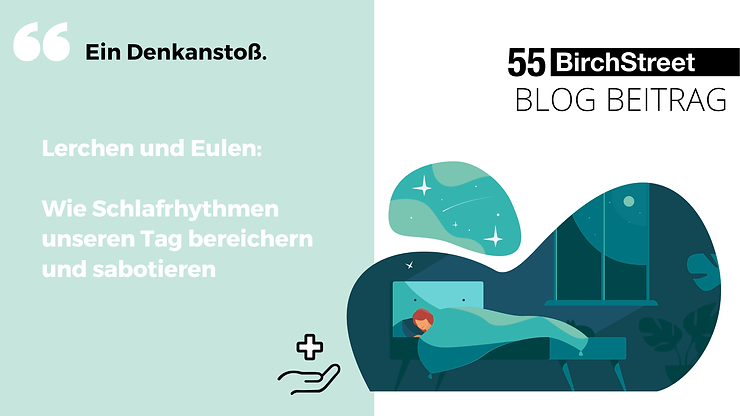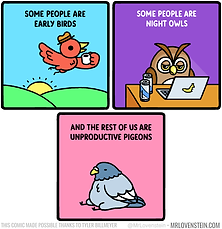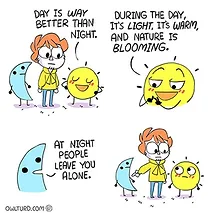
“The early bird can me” — I think at 06:00 at Malpensa Airport, while my inner night owl screams for a horizontal position, preferably in bed with down pillows or, alternatively, double espresso. And yet it also feels a bit exciting to work against my internal clock. After all, the larks have managed to shape our everyday working life and, at the latest with the upcoming time difference, it will feel again for a part of society as though we are leaning towards the workplace in the dead of night with crumpled faces in the blue light of our cell phones, where the coffee machine is the light on the tunnel. But there seems to be a widespread perception that there is a good The point is to sit at your laptop at 07:00 in the morning and hack into the keys. It must work, right? So does Elon Musk. But who said that worms aren't much fatter in the evening?
Bird species are the colloquial terms under which we usually categorize early and late risers, based on the respective biorhythms of the animals that give the name. Stumbled across it too? We usually say early risers because it is associated with the activity of starting, getting started and in some way positive things, while the other group is not called late risers or long-stays, but simply late risers. Sluggish, tired idlers rolling in bed while the sun is shining outside and working society is already getting on with it. Or do owls only perceive it that way because they (okay, we ourselves) secretly feel disadvantaged in everyday working life shaped by larks? Because who ever envies spending half the night sitting at a laptop? That seems more desirable at 07:00 in the morning.
Which of the two categories you now belong to is usually determined by the so-called Midnight: The midpoint of the time period, on which you sleep on days off. For example, if you sleep from 0:00 to 8:00 a.m., the middle of your sleep is 4:00 a.m. It is therefore independent of sleep duration and relates to preferred sleep times. Something like this:
If you now think you're not in either category, then that's not even that unusual, because contrary to this two-party system, there is still option 3, as is so often the case: The dove.

By the way, their midsleep is between 2:30 and 4:30. Pigeons make up around 64% of the total population. At least 32% are owls and convinced, established people Larks are rounded up at a modest 5%, which raises the inevitable question of who the grandiose I had the idea to give command to these 5%! 😤 It's a bit like going to the Anarchist Pogo Party of Germany (APPD) and saying, “Congratulations! You're running the shop now.”
Tired morning grouches? Not only that: According to various studies, night owls are far more susceptible to Obesity and cardiovascular diseases, as well as depressions. Statistically, increased alcohol consumption is also the order of the day, but they are also somewhat more creative. At least something! Sure, that doesn't even sound that good, but how much can the night owls here actually do for?
To make a long story short: In every organism in the world, there is a internal clock, better known as circadian rhythm. In humans, this is located within our hypothalamus — the part of the brain that regulates our sleep rhythms. If sleeping and waking times are counteracted by this, we get a problem. Why?

The brain's primary energy source is cerebral glucose. During healthy REM sleep phases, our metabolism slows down and thus saves this glucose for our waking phases. If our sleep patterns are contrary to our internal clock, this effect cannot take place to the necessary extent. The bodies of most of all night owls therefore work overtime during their forced rest period, a Social jet lag. The results: exhaustion, confusion, and finally stress, which repeats the procedure afterwards. It is not the sleep rhythm itself that is unhealthy, but the necessary adjustment against the circadian rhythm.
So: night owls are not naturally predisposed to depression, overweight, etc., because it is too dark or the like It is a break with your own sleep rhythm, which seems to be causing this. But there must be something that can be done about it, right?
Nope. I'm sorry.
Well, that's not entirely true either. Three ideas:
Although we may also have genetic predispositions, our internal clock fluctuates a bit over the years: Experts even found that school starts too early in line with the needs of young people! And just because you couldn't tear yourself away from the new Bridgerton relay one night or gambled until 2 at night and now feel haunted by night owls, we can calm down: This is not a permanent situation and anyway, getting up early is easier again in old age when the internal clock changes. Even though there is something terribly ironic about just being able to sleep in, and as soon as you retire, you're standing there at 6 o'clock with oatmeal and plum juice.
Like I said, live in Chicago but work in New York. Now that means what exactly? With the help of blue light therapy in the morning, experts can help some night owls adjust their internal clock a little bit so that their natural sleep rhythm is a little less annoying. The therapy communicates to the brain that it is in a different time zone than is actually the case — and so the internal clock adjusts to a certain extent. Quite involuntarily, actually, because therapy doesn't actually change the clock at all, but tricks it off by pretending that morning is at a different time. Recommended for people who particularly suffer from their night owl existence. It is best to consult doctors for this.
Sleep is immensely important for our physical and psychological well-being and should be maintained accordingly. We all have different needs and it should be in our own interest to maintain them if they are neglected. After all, many companies are also d'accord to let the company's owls work flexibly. More and more spaces also offer retreat options and the like; mindfulness about sleep occurs when we still have a lot ahead of us and need to break stigma.
What type are you and how much does your internal clock influence your most efficient hours?
For further reading:
Do you have a question or would you like to find out how we can work together?
Feel free to contact us here or via linkedin with us — we'd love to hear from you